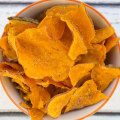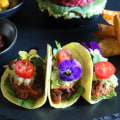What you can eat Fruits and vegetables, legumes such as peas, beans and lentils, nuts and seeds, breads, rice and pasta, alternatives to dairy products such as soy milk, coconut milk and almond milk, vegetable oils. Broccoli, turnip greens, artichokes, and black currants are also great options. Frozen fruit is useful for making smoothies and baking (pre-frozen fruit to cover oatmeal or non-dairy yogurts). Dried fruit can be taken to go with nuts or a mix of nuts used as a topping for breakfast cereals and baking.
Buy some vegetables to eat raw in salads, sandwiches, or with sauces. Pick at least 1-2 leafy greens for salad and sandwich bases. Choose a variety of fresh or frozen vegetables that are good for steaming, sautéing, sautéing and roasting. Frozen vegetables are an excellent staple food and are very versatile.
You can buy more when they're on sale without worrying about them going bad, they're easy to prepare in a hurry and can be a great healthy backup option if you miss a shopping trip. Frozen products tend to be more nutrient-dense than fresh products because they freeze quickly at their peak of maturity. A selection of available condiments, herbs and spices makes it easy to diversify your meals. These items usually last a long time, so waste isn't a big problem.
Buy dried herbs or spices that you don't use very often in the bulk products section in smaller quantities. For fresh herbs, wash and freeze any leftovers that you won't be using right away. Until more is known, vegans who want to achieve the recommended daily intake of vitamin B12 should consume fortified foods or talk to a health professional about taking supplements. For vegans who want to stay healthy, it's very important to eat a nutrient-rich diet with whole, fortified foods.


